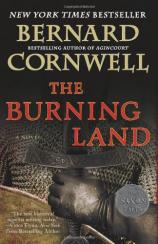The Burning Land
Review
The Burning Land
THE BURNING LAND is the fifth Bernard Cornwell tale about Uhtred, a fierce ninth-century warlord battling his way through enemy shield walls in an England waiting to be united. You should know this right away, along with the fact that it won’t be the last of the series. It’s hard enough to write one novel, but it’s downright difficult to pen five of them consecutively with the same characters and themes and keep the writing fresh and interesting. “Difficult” isn’t even the word; “impossible” is more like it. (Even the most devout Cornwell fan is going to have a hard time getting through the whole 20-plus volumes of the Richard Sharpe series without wincing at the umpteenth explanation of how Sharpe got his telescope or the workings of the deadly seven-barreled gun.)
But if you liked the first four volumes of Cornwell’s Saxon Tales, the good news is that there’s more of the same in THE BURNING LAND. There are cruel and disgusting Viking invaders, heartless and crafty priests, dangerous and exotic women, and the endless machinations of Alfred the Great, which invariably lead the doughty Uhtred into a welter of gore. Cornwell has not lost his deft touch in describing the joy of battle, the inexorable flame that runs through a warrior when he stabs someone in the eye with a spear.
One of Uhtred’s core beliefs is that his fate is determined by the three spinners of Norse legend --- that he is a plaything of the gods, to be turned this way and that. It’s easy to see why he might think so, especially because Cornwell uses him so often as a pawn. Uhtred is forever being manipulated by one character or another, and it doesn’t really help the narrative much that he is aware of this and is somewhat cynical about it. But there is one moment in the story after Uhtred has fallen for a truly transparent ruse where he is able to break free from the ties that bind him to Saxon Wessex. And this leaves him free to follow his own desires for once, where he can take his Viking longboat with the wolf’s head prow and finally settle an old score. It appears --- at least for a while --- that this will be the book in which Uhtred finally captures the unassailable fortress of Bebbanburg, kill his usurping uncle and reclaim his stolen patrimony.
If that had happened, it would be a truly impressive feat of arms, leading to a bloody and violent battle, ending in triumph and disaster. It would also end the series. And as you might expect, Cornwell has other plans for Uhtred --- and even though these plans lead him to another improbable battlefield, against a fearsome foe, it is still something of a letdown. This is not to denigrate THE BURNING LAND in any way; it’s superior entertainment (if you like your entertainment blood-stained and brutal). Uhtred is a fully-realized character, capable of great bravery and great foolishness, mixed in with --- as he might describe himself --- the deviousness of Loki and the thunder of Thor’s hammer in battle. And Cornwell’s eye for period detail and his capacity for pulling off deft reverses are still in place, which helps to keep the narrative turning briskly along.
The only thing to dislike about THE BURNING LAND is that it didn’t go in the direction that the main character (and at least this part of the readership) wanted it to go. But that means that the issue of who holds Bebbanburg Castle will be resolved in another volume, and given Cornwell’s talents, that will be a book to wait for indeed.
Reviewed by Curtis Edmonds on December 26, 2010
The Burning Land
- Publication Date: September 1, 2010
- Genres: Fiction, Historical Fiction
- Paperback: 368 pages
- Publisher: Harper Paperbacks
- ISBN-10: 0060888768
- ISBN-13: 9780060888763





